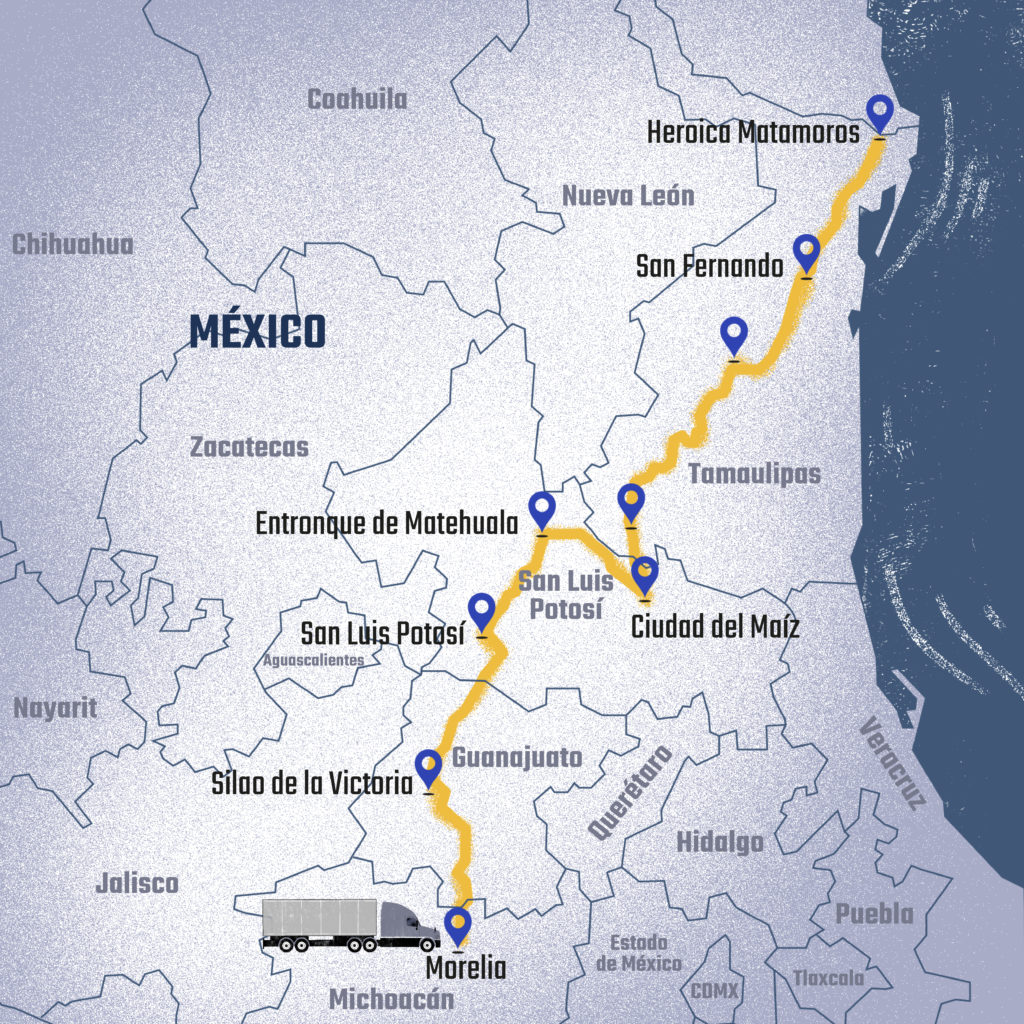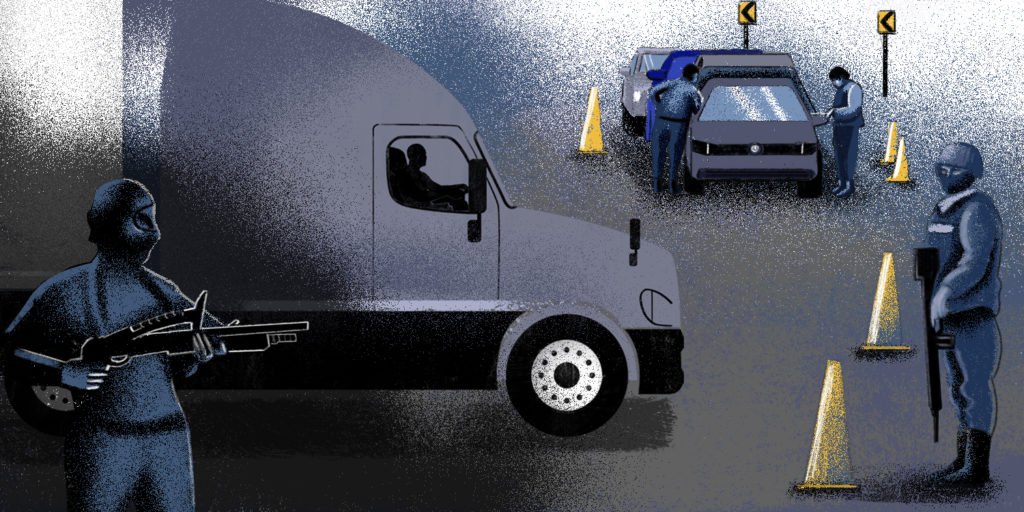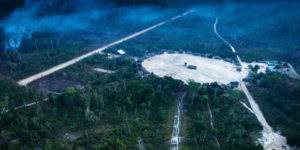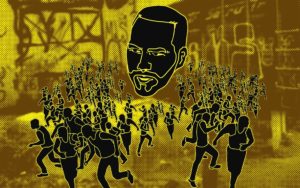Since last year, Alberto*, an experienced driver, has been hauling migrants in the trailer of the truck he drives. In this interview, he describes in rarely revealed detail how the clandestine migrant transport business works on the road from Michoacán to Tamaulipas on the U.S. border. His trailer only carries migrants when the cartels ask, otherwise it carries vegetables and fruit.
By Martha Olivia López
Illustration: Alejandra Saavedra Lopez
We interviewed Alberto in November 2023. We’re not telling you his real name nor the location of the meeting to preserve his safety. Sometime ago he had been contacted to do a first trip, through Michoacán, a state in central-western Mexico, transporting migrants clandestinely in the trailer of the truck in which he used to carry fruit or vegetables. Before that, and for 25 years, he drove a pickup truck in an ejido in north-central Tamaulipas carrying fruits, vegetables and other products.
He looks older than he is. He knows he’s in the hands of the criminals who forced him to make these trips, and that the police may one day decide to stop him and put him in prison to show they are doing their job. The fear is constant. “Although it’s liberating when many colleagues tell you that they’ve already done it and that nothing happens,” he says. Of every ten trips he makes with his trailer truck, he says he only makes two or three with “cargo without cargo”, as truck driver say when referring to carrying people.
Agreeing on the topic pressured for time, just 38 minutes of interview although the agreed time was 20 minutes, we skipped all the protocols and went straight to the point:
I heard on the news that for some time now there have been people carrying migrants to the border in trailers. Do you know about this?
Alberto: In fact, it’s happened to me on occasion. I mean, the bad luck of being forced to carry them.
How long have you been a trailer truck driver?
Alberto: We started in 2013.
And what do you usually transport?
Alberto: In my case it’s what you take in a refrigerated truck.
What are the characteristics of those trailers?
Alberto: They are white box trailers. Closed box.
Do the people always survive locked up in there?
Alberto: Yes, because you put the fan on and open the back vent to let the air circulate.
And how and where does this transit take place?
Alberto: They (the migrants) arrive in Tapachula, Chiapas and from there they go as best they can to Mexico City. Those who decide not to pay for transportation normally take tourist buses. Most of them get detained because no one protects them or takes care of them, sometimes they are even kidnapped.
They do it in groups…
Alberto: Yes. That is why you regularly see on the highway that the National Guard has detained them, because they don’t carry permits.
Where do those who do hire the service and come in a trailer gather? In Mexico City?
Alberto: The contacts of the coyotes are at the Mexico City bus station. They approach them and tell them “you know what, we have safe transportation from Michoacán to the border of Matamoros or Reynosa, but you have to pay 13,000 to 13,500 pesos per person”. (That’s almost 800 US dollars).
And after that, they are convinced at the station, they get the money together and where do they go?
Alberto: They go on their own to Michoacán. Once in Michoacán, those who traffic them approach us and ask you if you are a truck driver and say, “You know what, I need you to take a load to Matamoros, we are going to pay you. At first they may offer you 80,000 to 100,000 pesos, a thousand for each migrant, bringing 50 to 100 people on the trip (a thousand pesos is about 60 dollars). The business seems legal by its appearance, without any excessive care, just do it quickly, but as a precaution so that other cartels do not steal ‘the load’.
What does this trailer look like to those of us driving on the highway? What is it used for?
Alberto: They are trailers that carry cucumber or watermelon and when we bring people they do not hide because they pay the National Guard 500 pesos per migrant.
How many times?
Alberto: As many times as they stop you. It can be three, four or five times they stop you. Sometimes they don’t stop you. Then you can circulate freely. There is a checkpoint you can’t escape, where you have to pay is with the soldiers. There you also you have to pay 500 per migrant.
Let’s continue with the route. They arrive in Michoacán and get put in the trailers?
Alberto: Yes.
And from there what route do you take?
Alberto: From there you take the Michoacán to Silao on the free highway to San Luis. Then you take the San Luis beltway and get to El Huizache or to the junction with Matehuala, you go to the Ciudad del Maíz and Tula junction. From there you come here (…) it is already a free highway within the state. They usually tell you to go to Buenos Aires between two or three in the morning, better known as The greek Y, because there is no migration agents at that time.
Is the place on The Y the San Fernando one, the one that goes between Reynosa and Matamoros?
Alberto: Yes.

How many hours does it take from Michoacán to Matamoros, on average?
Alberto: It depends on the traffic, but it can be from 10 to 15 hours.
How do they eat, what are the stops they make?
Alberto: You are not allowed to stop. There is no consideration for making them comfortable or well fed. What is important is that they reach their destination.
Are they generally men, women or what ages are they?
Alberto: They can be children, babies, women, entire families.
And why do they pass The Y at dawn?
Alberto: Come on, you don’t want to pay pesos you go at dawn, because if Migration stops you or catches you, you have to give them a thousand pesos for each migrant.
And how do you make the payment?
Alberto: At Michoacán they give you a mobile phone. From there you have to talk on this phone with those who hire you to bring them. I don’t know if it is a person who comes or if they make a transfer or something, but until the payment is authorized or they confirm that they have that payment they do not let you pass, although they don’t detain you. When they let you pass it is because they have already received the payment.
It could be a transfer, surely…
Alberto: It could be a transfer. I think it’s a transfer because that’s the quickest way. In fact, sometimes, when the road is very heavy, unsafe for the cargo, they tell you: “You know what, stop in the state capital”. They also have safehouses.
In a second interview, Alberto* explained that houses where they keep migrants are located in the outskirts of cities, so not draw attention and they can leave freely when they are authorized to continue their journey to Matamoros.
And what are these safehouses for?
Alberto: They pick up the people in different vans and bring them to the houses and there is someone to feed them and watch over them to make sure no one steals them. Then another colleague comes along or they themselves in their vans can take them a few at a time. But regularly the trip is direct and you arrive. And there they pick them up, either in Matamoros or Reynosa. When you deliver the package, they pay you right there.
How much?
Alberto: Sometimes they pay you well for the first trips because for them it is important that you consider it, that you say, “Well, it is better for me if they send me on another trip because I am going to earn another 80 or 100,000 pesos”. It is to hook you, to get you excited. A normal trip would normally pay you five or eight thousand pesos, and they are offering you 70, 80, even 100 thousand pesos, which is a lot of money (100 thousand Mexican pesos, approximately 6100 dollars at the current exchange rate). But many colleagues do it more regularly, and they say that when you go on the second or third trip, they no longer give you what they promise, they give you what they want. Sometimes they only give you 25,000 pesos and you have to take it.
Could you tell me a little bit more about taking care of them?
Alberto: The safehouses are regularly changed so that they can’t be found, but there are always people at a distance, it can be a block or two blocks away, who are watching the houses and looking out for unknown vehicles or other people watching the houses or seeming suspect somehow. They have to be vigilant so that no one steals the migrants.
That means that another cartel might come and steal them away?
Alberto: That’s right.
Where do they have safehouses, I mean, if we come from Michoacán, Silao, San Luis, where do they have the houses?
Alberto: Apart from Michoacán, they have another safehouse in San Luis de la Paz, across San Luis Potosí. Most of the people you see there are migrants, but since it is an ejido nobody takes it into account. There too, when you go to load cucumber, they take the opportunity and say: “You know what, we are going to load you with this many people, nothing is going to happen to you, you are just going to get there, everything is arranged”. And then there is no option, you can’t say “I’m not taking them” because they take your truck.
Who are the ones who manage all this business?
Alberto: Well, the drug cartels. Here the danger you run when transporting migrants is if an opposing group notices you or identifies you or catches you, because you can lose your life.
Which cartel controls each point, Mexico City, Michoacan, San Luis, Tamaulipas, or do they coordinate with each other? Which cartel is there when they arrive in Reynosa and Matamoros?
Alberto: Cartel del Golfo is the one that transports migrants.
How long has this trafficking in trailers been going on?
Alberto: We had heard about it but it hadn’t reached us, but about a year ago it started, we’ve had to do it three or four times during the year.
They come and tell you ‘it’s your turn to do this’…
Alberto: I need you to take this many people, don’t worry, nobody is going to do anything to you, the authorities are paid for, they don’t hide them. If your trailer has tarps you can bring them uncovered or with the windows open so that the air can run through them because there is no danger of the authorities seeing them. They already know, the moment you are stopped and they see them, they know who you belong to and what they have to do. They have to get paid and for them it is better if they find you because they will get paid, in fact, it is more money. More money, yes?
As a truck driver there is no way to escape this threat, is there?
Alberto: Yes, there is nowhere to go, either you take them or you take them.
Have you had any of your colleagues suffer reprisals?
Alberto: They threaten their families. I don’t know how big a reach they have when they offer you the job. They tell you “Look, if you refuse or if you betray us, we know that your family lives in such and such place,” and you are shocked because you say, ‘nobody knows me here,’ but by the time they talk to you, they already have you completely identified.
Is the movement constant or have there been months when there is less demand?
Alberto: Yes, the work is evenly loaded, you can say that two or three thousand people pass through their hands every month…Throughout the Mexican border, different cartels do the same thing. In fact, the 13,500 pesos at the beginning are just to get to the border and then there are the coyotes, the ones who cross them, who charge from 4,500 to 5,000 dollars per person.
To cross them?
Alberto: They have safehouses on the border – in Matamoros, in Rio Bravo, in Reynosa – that are regularly changed so that they cannot be located. Each coyote goes there and takes 10 to 15 migrants. They have to take a photo of each person and that photo is distributed among the other companions, among the other coyotes, because it is assumed that by paying the 4,500 you are making sure that you cross into the United States and if, for some reason, one of them gets lost or one of them drowns, the coyote or the person in charge pays with his or her life.
And this is a common thing?
Alberto: Yes, it is a law they have that if you take ten people, you have to arrive with ten people.
Because one person that gets lost is money lost?
Alberto: Yes, if one of them gets lost they start looking for him, because they all have the photograph, until they find him and recover him.
Going back to the “cargo without cargo”, how do you keep track of the people you carry, do you count them, do you know their names, do you know their cell phones?
Alberto: It is a number, nothing more. They count children, people, women, elderly, and men alike, it is a number. They tell you, “Take 50 people, among them there are children, babies, women, teenagers and I will give you a thousand per person.” Even though they don’t seem to care about the authorities, the reality is that the traffic is painful and without any consideration, sometimes in the worst conditions due to the climate, or the health of some migrants, which is not taken into account.
How do the travellers go in the trailers?
Alberto: Just as the box is, that’s where they get in and that’s where they sit. And that’s how they go.
And to relieve themselves?
Alberto: There is no time to relieve themselves, just as they come.
And they know they will be travelling in those conditions?
Alberto: I would like to think that they are warned before starting the trip. The driver is only in charge of arriving and not stopping until he gets there. With the phone they give you on the way they talk to you and ask you where you are coming from, you have to stop in such and such a place or go straight ahead, don’t stop and so on. If the authorities stop you, you have to dial from that phone and tell them that they stopped you in such and such a place and if it is the National Guard or the soldiers or another authority.
What do you do when there is a critical situation with people?
Alberto: Well, it has happened that when the situation gets out of control, they abandon them. If the truck fails, if other people stop you, you secure your own life, you say you know what? you keep the truck and what’s inside, I’m leaving. And if you’re lucky they let you go and if not, you go with them.
Have there been any cases in which something has been done to drivers like yourselves?
Alberto: Not so far because your trip is secure. The only thing is that when you abandon the migrants, they’re often blind because they don’t know where they are going. That is when the opposing cartels take advantage of them to work.
A Central American person recently told us that in Reynosa they were getting off the trailers in a very large open lot as if there was nothing to it. Does this happen?
Alberto: They are called patios, they are parking lots over there, they might be the truck company’s or the cartel’s. They are secured areas where they know that no one else can see them, meaning the authorities.
How many trips as a driver do they offer you per month?
Alberto: It’s either random or you have the bad luck of having to go to load at the place where they are doing the trip. They do it randomly, it’s not that you as a driver are working for them, but that they come and tell you “I need you to make this trip for me, everything is already arranged, go”. They don’t tell you “you’re going for migrants”, you’re doing your normal job.
You never know?
Alberto: No, you never know if you get unlucky and have to do a trip, and you have to do it.
What was the first time you made one of these trips with migrants?
Alberto: We were in a town in Michoacán loading fruit and we were in the yard. A person arrived in a pickup truck and asked us where we were going and I told him we were going to another town in Tamaulipas. He asked me: “Where is it?” I answered that it was near Rio Bravo. And he told me that he needed me to make a trip, that everything was arranged and that nothing bad was going to happen. That’s how they start to pull you in and you start to tremble inside, thinking the worst, the first time it happened to us, the truth is, we were very scared and with the fear that we would not get out of this one.
How much did they offer that time?
Alberto: One thousand per person.
And how many people did you bring?
Alberto: We had 62** people. We had an ugly hole in the pit of our stomach, fear because you don’t know how these things work; you have never had to do something like this. You think you are not going to get out of it.
What was the worst part?
Alberto: The soldiers’ checkpoint was the place where we thought they were going to stop us. Nerves betray you. The army stops you and says: “where are you going, where are you coming from, okay, stop, we are going to check you”. Then you say, “you know what’s going on, this and this”. They pass the ball back to you and tell you to talk on the phone and dial the number and tell them that they stopped you in such and such a place. They tell you to put the officer on the phone and they do their business and then the officer just comes and tells you that you can go ahead. But there were moments when we thought we were going to end up in jail or I don’t know what. You think of everything, of the helplessness that you can’t do anything, that your freedom is over.
The telephone is given to you by the organizers and from there you call when there are roadblocks?
Alberto: Yes.
When the trip was over, the delivery, what did you feel?
Alberto: The fear of the next trip, of thinking if they are going to be waiting for you again. You start to talk about it with the other colleagues and someone comes out and says “hey no, nothing’s wrong with you, this happened to me and to the other and to the other”, and that’s when you feel liberated, when you say “ok, well it’s not going to happen every trip”.
Are the owners of the truck lines generally aware of this?
Alberto: The coyotes communicate with the movement person, a person who is in charge of getting the trips. That person is aware of whether you call him, for example, as their driver, and tell him “I need you to send me expenses because I don’t have enough money for food”. He is in charge of the drivers, of telling them today it is your turn to go to Silao, today it is your turn to go to Apatzingán, to different places. So the call is to that person, “you know what, your trailer is on its way back, it is not carrying the load because this and this happened”.
So the deal is not with the owner of the line but with the one who organizes the trips?
Alberto: The line does not work for them but they (the coyotes) take advantage of the trailer’s trip so that everything circulates normally, because if they steal the trailer then the line reports it. So they run more risk of being caught for the theft.
Could the employees of the transportation line that owns the trailers be the ones coordinating?
Alberto: That’s right. The owner only receives his money. As in all companies, there are people in charge of different areas and they take care of the trips, the fuel, the driver’s expenses. I don’t know if, when talking to those managers, they are offered some amount so that they don’t say anything. I do not know about that.
Why do you think that the passage of migrants does not stop in Mexico?
Alberto: Because it is a very juicy business for the cartels, it could be said that they pay more attention to migrants than to drugs.
What about the government?
Alberto: The government knows it, most of them pay the so-called quota to get through.
Does it happen that a cartel stops someone who is carrying migrants under the control of another cartel?
Alberto: This practically does not happen but there has been a case or two. That is why there are the so-called plazas, because they have control of those stretches and can move freely.
How do the truckers inform each other that they are carrying a load?
Alberto: You talk to your colleague and tell him: “I got a bad one, and we are loaded without a load”. They tell you to be careful and that you know what you have to do, not to take any risks, to try to do everything possible to avoid any problems.
Obviously the family doesn’t know…
Alberto: No, they don’t know.
Are there options to get out of that activity?
Alberto: The advantage, so to speak, is that we are not inside; it is not always your turn because you are not their driver. It’s eventual, it’s randomly that you get a trip like that. The same thing happens with drugs, with crystal meth, they make you operate in the same way.
At random?
Alberto: Yes, they come to you and tell you: “Hey, we are going to change the batteries in your trailer arriving in Matamoros, there will be a person waiting for you, you are going to give him the batteries and he will give you other batteries for your truck”. They usually change them all. The four batteries are big. They tell you: “If you arrive with the load we will give you 50, 80, sometimes 100 thousand”, sometimes more, depending on the value of the load.
Out ff every ten trips made in this way, how many do you estimate are migrants and how many are drugs?
Alberto: Let’s assume that you get the bad ones, in those ten trips you can get two with migrants and one with drugs. And the two with migrants will have 50 or 100 people each.
Why doesn’t Migration authorities stop them?
Alberto: Unfortunately, Migration is of no use to us; the soldiers are of no use to us if they cannot stop this trafficking because for them it is trafficking and it is profit. With that they finance everything they have, their weapons, everything comes from human trafficking.
Note: This journalistic alliance sent questions to the National Migration Institute, the National Guard, and the Sedena so that they could respond to these accusations made by Alberto and other witnesses interviewed. We also asked them for information on the number of officials investigated and/or dismissed from their institutions for corrupt practices. As of publication time, we had not received an answer from INM nor from Guardia Nacional. Sedena responded that “this Secretariat does not have the powers to intervene in the business you ask about” and request us to present our questions to the General Prosecutor’s Office or the NMI.
*Alberto is not the truck driver’s real name. We changed it to protect his identity for security reasons.
** The number of migrants Alberto carried on his first trip has been changed to protect his identity.
A journalistic investigation coordinated by Noticias Telemundo and the Latin American Center for Investigative Journalism (CLIP) with the participation of the International Consortium of Investigative Journalists (ICIJ), Bellingcat, Contracorriente (Honduras), Plaza Pública (Guatemala), EnUn2x3-Tamaulipas, Chiapas Paralelo and Pie de Página (Mexico). Legal review: El Veinte







